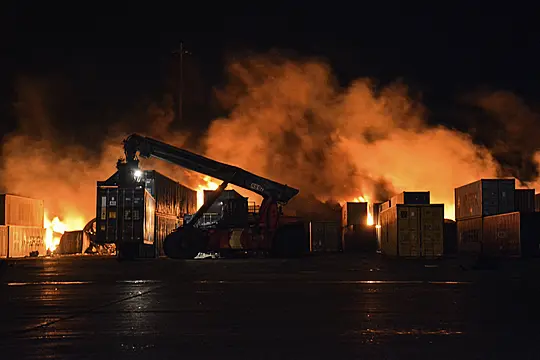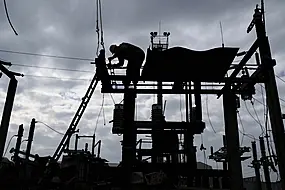Firefighters have contained a blaze that raged for hours in Syria’s port of Latakia, officials said, hours after Israel launched missiles from the Mediterranean Sea, igniting the fire in the container terminal. It was the second such attack on the vital facility this month.
The early morning raid on Tuesday was a rare targeting of the port, which handles most imports to Syria, a country ravaged by a decade-old civil war and sanctions imposed by the west. The previous attack took place on December 7, when Syrian media reported that Israeli warplanes hit the container terminal, also igniting a serious fire.
Syrian officials and state media said Tuesday’s attack caused more damage and the explosion could be heard miles away. Syrian air defences were activated when the missiles started to fall on the terminal at around 3:20am, state media reported.
A military official said Israeli missiles were fired from the sea, west of Latakia, hitting the terminal and igniting fires that caused serious damage. The unidentified official, quoted by the official state news agency SANA, said firefighters battled the flames after the attack.

There were no immediate reports of casualties, according to SANA.
Syria’s state-run Al-Ikhbariyah TV ran footage showing flames and smoke rising from the terminal. It later aired images of broken glass and other damage at residential buildings and cars parked in the area near the port. It said a nearby hospital was also affected.
Areporter for Al-Ikhbariyah said Tuesday’s attack could be heard in Tartus, another coastal city more than 80 kilometers (nearly 50 miles) away.
Major Mohannad Jafaar, head of the Latakia fire department, said 12 fire trucks worked for hours to contain the fire. He said the containers that were hit held spare auto parts and oil, but there were no casualties. Footage from the area showed large black plumes of smoke over the port as various fires burned around the terminal.
Port manager Amjad Suleiman told Al-Ikhbariyah the damage was much greater than that caused by the attack on December 7 and required a major effort to move intact containers away from the flames.
At the time of the earlier attack, the Syrian Observatory for Human Rights, an opposition war monitoring group based in Britain, said the airstrike had hit arms shipments destined for Iran-backed fighters.
The Israeli military declined to comment on the reported strikes in Syria. But in a year-end statement issued by the military, chief of staff Lieutenant General Aviv Kohavi boasted of success in disrupting weapons shipments to Israel’s enemies in the region.
“The increase in the scope of operations over the past year has led to a significant disruption of the movement of weapons into the various arenas by our enemies,” he said. The statement did not elaborate.
In its year-end assessment, the Israeli military confirmed carrying out strikes on dozens of targets in Syria in what it called “the campaign between the wars”. Three targets were also struck in Lebanon, it said. It gave no further details.
It also reported about 100 operations by the Israeli navy, including dozens of “special operations”. It did not elaborate, but the navy operates in both the Mediterranean and Red seas.
The Israeli military rarely comments on individual attacks or discusses details of such operations.
Some past strikes have targeted the main airport in the Syrian capital of Damascus.
Israel says it targets bases of Iran-allied militias, such as Lebanon’s militant Hezbollah group, which has fighters in Syria. It says it attacks arms shipments believed to be bound for the militias.







